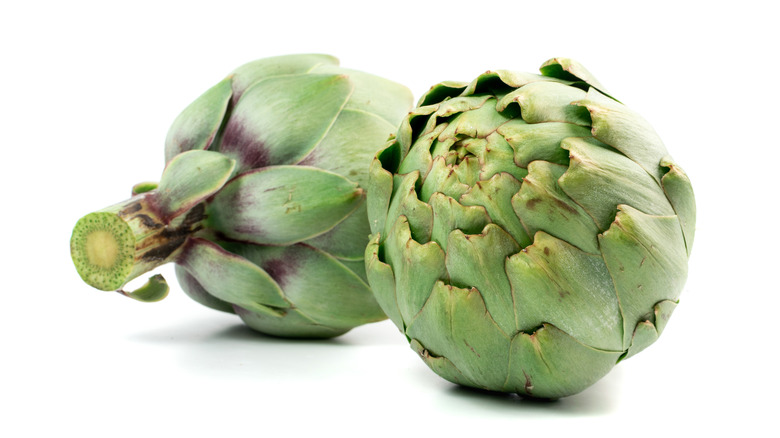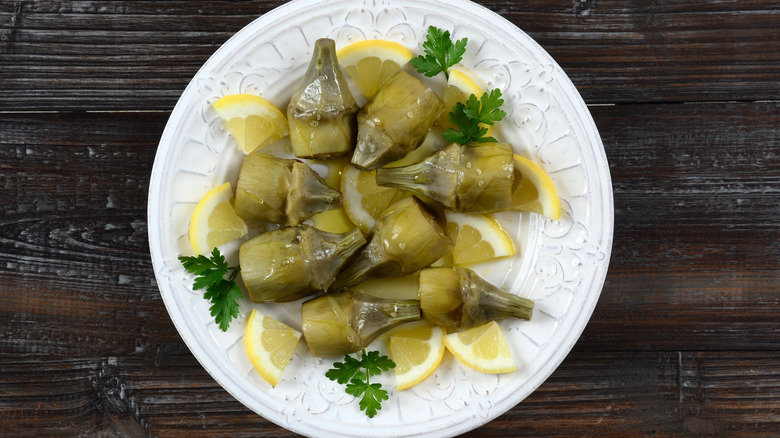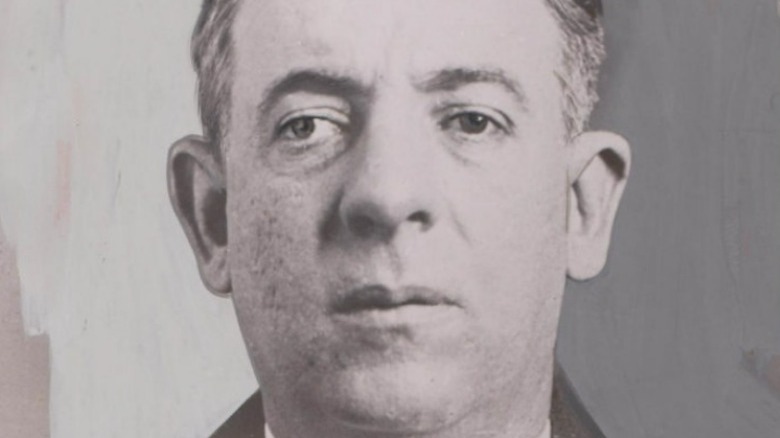The Bizarre Reason Artichokes Were Briefly Banned In New York City
There are many reasons things are banned in history. Alcohol was banned between 1920 – 1933 in an effort to prohibit what was perceived as a drunk epidemic. Time travel media was banned in China with the excuse that it was "disrespectful" to history, according the New Yorker, and Singapore banned chewing gum in the '90s as a way to improve the cleanliness of the city. However what could be gained by a ban on artichokes?
While the sentence, "what do the mafia and artichokes have in common?" might seem like a bit of a joke, it turns out that in the 1930s, the mafia and the unusual-looking vegetable actually shared a little history in the Big Apple (via Atlas Obscura). Take a step back in time for a moment, and imagine it's December 21, 1935. You're a worker at the Bronx Terminal Market and the usual hustle and bustle in the darkness of the predawn coldness seeps into your bones but you forget it for a moment as you're caught off guard by the site of a number of policemen who happen to be with the Mayor of New York, Fiorello LaGuardia.
The Mayor mounts the back of a vegetable truck to a trumpet fanfare and in a loud voice proclaims that there is now a ban on baby artichokes. You may be a little taken aback by this strange ban and wonder if there's another motive behind it.
Why baby artichokes?
"It is impossible not to conclude the world today is a bit mad," said the New York Herald Tribune the following day on December 22, per Food Passages. While it might seem like a crazy idea by the New York Mayor, it actually turned out, he was a bit of a hero because there was a purpose to his seeming madness. The Pittsburgh Press reported that Fiorello LaGuirda shouted, "I know you dealers are honest men and as long as I am Mayor, no racketeer, thug or punk is going to intimidate you."
According to the NYC Department of Records and Information Services, the baby artichoke trade, which existed in Italian neighborhoods, was not tracked by police. The trade flew under the radar of the Secret Service and therefore the Mayor was able to interrupt the operations of the Morello crime family without affecting the investigation into the mafia's counterfeit money operation. At the center of the artichoke extortion racket was one man known simply as "The Artichoke King."
Who was the Artichoke King?
Ciro Terranova aka "The Artichoke King" had a reputation for violence from an early age (via the Mob Museum). Between the years 1916 – 1925, he already had quite a rap sheet including disorderly conduct, homicide (discharged), robbery (discharged), and material witness in homicide. Some of his schemes appeared to involve complex plans including murder contracts with other crime bosses and a gala heist in 1929. However, it was his reputation as the Artichoke King that he is remembered for most in historical records.
The artichoke needs a particular climate and environment to grow successfully, therefore, according to the Mob Museum, "its availability is limited." While it might seem an odd criminal market to corner, Terranova obviously saw the potential and it's estimated that he made close to $10 million between 1925 and 1935. The racket was typical of crime extortion styles — "vendors bought the product from gangsters at whatever price the gangsters set or had to face the consequences."
Three days after the New York Mayor's proclamation, the racket was broken, gangsters involved in implementing Terranova's extortion were arrested, and the ban was lifted.


